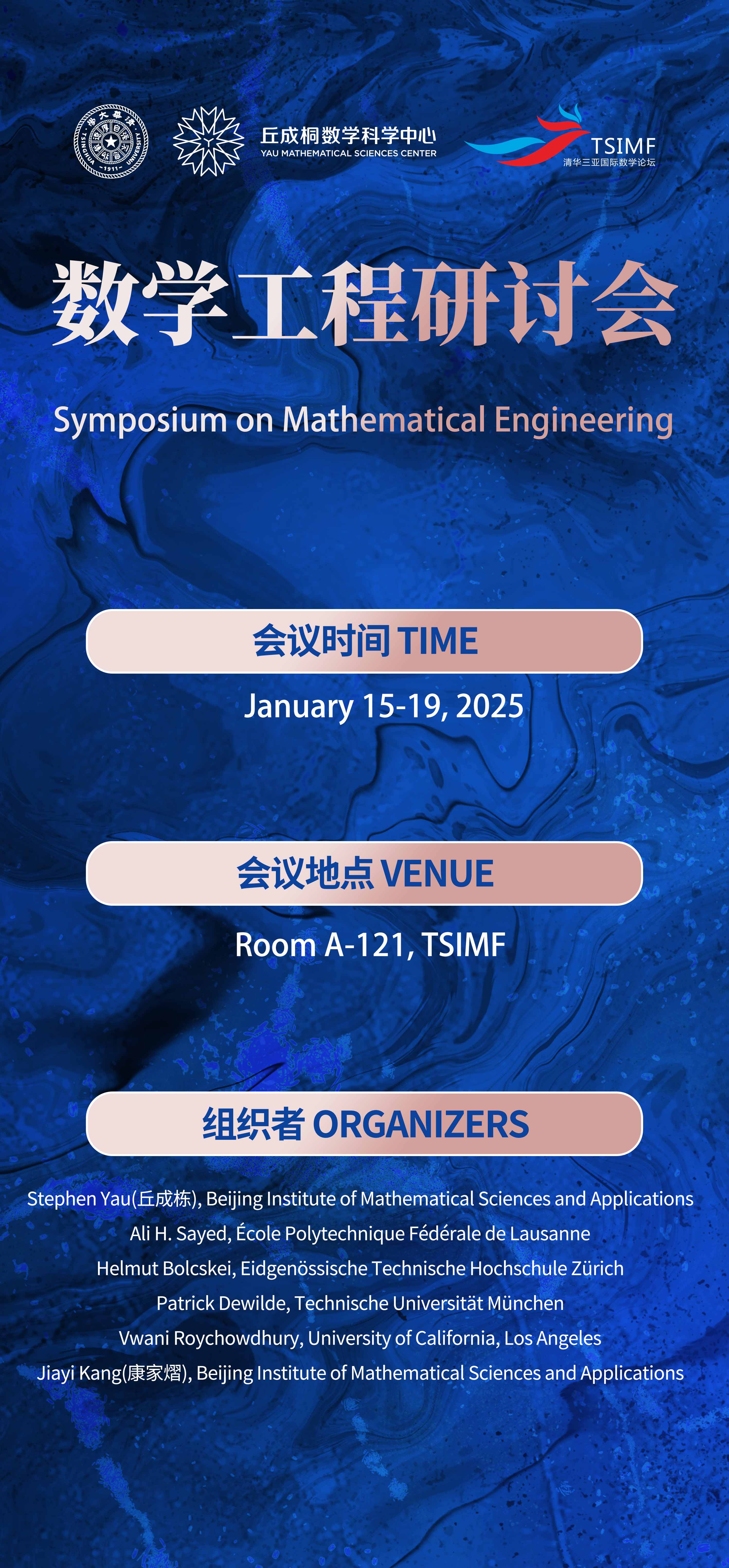会议摘要(Abstract)
本次会议的主题是探讨如何通过数学工程以及数据驱动的方法来解决复杂的工程问题。数学工程是运用数学方法解决工程难题的学科,它基于数学定律,这些定律不仅可以描述许多物理和自然现象,也适用于解决多种工程问题。
近年来,随着新兴工程领域的快速扩展,特别是在信息生成与管理领域,对工程问题进行原创性数学分析的需求大幅增加。我们使用的系统变得愈加复杂,许多领域需要运用更加智能化的手段,包括信息的收集、评估、分析以及从中得出结论并实施有效控制。这种复杂性促使我们开发出更加精细的数学工具和方法,以应对这些挑战。
在现代社会中,许多领域都迫切需要新的数学方法,例如大数据处理、传感器网络、深度学习、自动化系统以及大规模的环境建模等。在这些领域中,数学工程的核心工作是首先开发出有效的模型,随后通过合适的数学工具处理这些模型,并引导它们的演化过程。自动驾驶技术就是其中的一个典型例子。尽管该技术取得了长足进展,但目前自动驾驶的认知能力还远远无法与人类驾驶员相媲美。自动驾驶系统的可靠性仍然落后于人类驾驶员,差距甚至高达1000倍,缩小这一差距将需要在数学领域进行重大的技术创新和研究。
此次研讨会邀请了一批以研究为导向的工程专家和应用数学专家,他们当中有许多是这一重要领域的开拓者。与会者将通过交流思想、分享经验和探讨前沿问题的解决方案,共同推动数学工程领域的进一步发展。
The topic of this conference is the application of mathematical engineering to solve complex engineering problems using mathematical methods and data-driven methods. Mathematical engineering is the art of solving engineering problems using mathematical means. Mathematical laws characterize many physical and natural phenomena. The same holds for many engineering problems.
The need of original mathematical analysis of engineering problems has greatly increased in recent times, in parallel with the massive development of new engineering fields, especially in the very wide area of information generation and management. The rapid increase in the complexity of the systems we use, and the need to use more refined intelligence (such as the ability to gather information, evaluate it, derive conclusions from observations and putting in place effective controls) in a large variety of areas requires the development of more refined mathematical means.
Modern fields of endeavor requiring novel mathematical efforts include the handling of large data sets, sensor networking, deep learning, autonomous systems, large scale environmental modeling, and many more. In all these cases, mathematical engineering starts out with the development of effective models (the accurate but simple modeling of engineering phenomena is a major issue in itself), followed by the development of adequate mathematical tools to handle the models and to steer their evolution. This process is perhaps best exemplified by autonomous driving, which still has a long way to go before it can rival the cognitive abilities of a driving human (the reliability of an automatic car driver is still a factor of a thousand off mark, and it will require major mathematical effort to solve just this problem).
This conference assembles a limited number of research-oriented engineers, many of them among the pioneers in the development of this crucial field, and who want to exchange their ideas, present experiences and share views on how to deal with novel problem challenges in the field.
举办意义(Description of the aim)
本次国际会议汇聚全球工程学与应用数学领域的顶尖专家,聚焦数学与数据驱动方法在复杂工程问题中的创新应用。会议旨在搭建跨国界、跨学科的高端交流平台,推动知识共享与技术协作,加速相关领域的前沿突破。
随着信息科学领域工程技术的飞速发展,对数学建模与分析的需求持续攀升。面对大数据流实时处理、传感器网络效能评估、自主控制系统开发等关键课题,亟需先进技术手段支撑。本届会议将系统探讨最前沿方法体系,重点解析其在真实工程场景的转化路径与支撑效果。
主要议题包括大数据集、传感器网络、深度学习、控制系统和环境建模中的开放难题。数学工程在解决上述难题中发挥双重作用:一方面正确构建工程现象数学模型,另一方面利用前沿应用数学工具解决模型对应的工程领域中的开放难题。本次会议也将包括自动驾驶等专题研讨,通过具体领域典型案例展示数学方法如何解决前沿难题。
通过此次会议,我们旨在推动数学工程学科理论体系的完善,推动更深入的国际合作,并为应用数学界与工业界提供一个沟通交流的平台。
This international conference gathers world-class experts in engineering and applied mathematics to address the challenges of solving complex engineering problems using mathematical and data-driven methods. It serves as a platform for fostering collaboration and exchanging cutting-edge knowledge, bringing together both domestic and international participants to drive innovation and advance research in this field.
Recent advancements have heightened the demand for innovative mathematical analysis, particularly in the areas of information generation and management. The ability to efficiently handle large data flows, evaluate sensor networks, and develop autonomous systems requires advanced techniques. This conference will explore these state-of-the-art methods, focusing on their applications across various engineering domains.
Key topics include the challenges of managing large data sets, sensor networks, deep learning, autonomous systems, and environmental modeling. Mathematical engineering plays a vital role in these areas, starting with the development of models that simplify engineering phenomena and continuing with the creation of tools to manage these models effectively. Autonomous driving will be highlighted as a prime example, where mathematical advancements help bridge the gap between human and machine performance.
Through this conference, we aim to significantly contribute to the development of mathematical engineering, promoting deeper international collaboration and creating opportunities for innovation that will benefit both academia and industry.

Stephen Yau, Tsinghua University
Jie Huang, The Chinese University of Hong Kong
Benmei Chen, The Chinese University of Hong Kong
Jiayi Kang, Tsinghua University